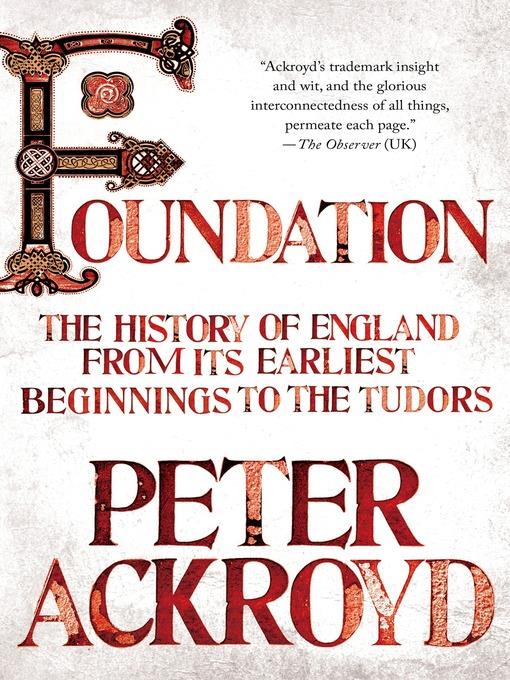
Foundation
The History of England Series, Book 1
کتاب های مرتبط
- اطلاعات
- نقد و بررسی
- دیدگاه کاربران
نقد و بررسی

August 6, 2012
This first in a projected six-volume history by über-prolific novelist and literary biographer Ackroyd (London: The Biography) starts with the Stone Age, devotes most of its pages to the Middle Ages, and ends with the death of the first Tudor king, Henry VII, in 1509. Beginning with the earliest archeological remains dating to 900,000 years ago, Ackroyd continues from the first to the 13th centuries. when England was continually colonized and exploited by foreigners, including various Germanic tribes such as the Angles and Saxons, Vikings, and Normans. Ackroyd’s parade of monarchs includes mostly ruthless abusers of England’s resources, while the author also outlines gradual steps toward democracy. The first Plantagenet king, Henry II, imposed a system of national justice and destroyed Archbishop of Canterbury Thomas à Becket; King John was forced to guarantee his barons’ rights through the Magna Carta; and Edward I established the Parliament, but brutalized Scots and Jews. Although the storytelling is witty, provocative, and highly readable, the history is flawed—too many years are stuffed into one volume to be truly satisfying, and Ackroyd’s repeated claims about deep continuity often feel forced, such as linking the Kentish uprising against Richard III to a modern-day Kentish miners’ strike as a sign of the people’s fierce independence. 51 illus.

August 15, 2012
Once again, Ackroyd (London Under: The Secret History Beneath the Streets, 2011) exhibits his magic touch with the written word, this time with the first in a six-volume history of England. The first few thousand years of English history is understandably sparse. Written records amount to a few carvings, physical evidence is found in barrows or other burials, and myths passed down over the years tend to become adulterated. The author spends little time in the years of Roman rule, other than to point out that the pilgrims' paths and the great Roman roads are on prehistoric pathways to shrines and holy wells. Ackroyd's genius is in his focus on individual kings and on England alone, without Scotland, Ireland and Wales. He explains some myths, debunks others and brings England's kings to life. Change was slow but inexorable. From even the earliest times, England had central, organized administrations, an aristocratic society and social stratification. However it came to pass, the country has always held a sense of community. Alfred the Great set the foundations for civil service, the judiciary and Parliament; most of today's villages in England were formed before the 12th century; King John's reign increased the use of written records; and it wasn't until the 14th century, with the arrival of the Franciscans and Dominicans, that sermons were first delivered. Curiously, invaders occupied the land from the first through the 13th centuries, and England's monarchs have all had non-English origins, from the Normans through to the Hanoverians (e.g., French, Welsh, Scots). Delightfully, with each king, Ackroyd summarizes their good and bad attributes along with delightful non sequiturs, such as the first use of the handkerchief. A true history of England tightly focused on the building blocks that made her.
COPYRIGHT(2012) Kirkus Reviews, ALL RIGHTS RESERVED.

May 1, 2012
The award-winning Ackroyd offers the first in a six-volume history of England, moving from primeval forests and the appearance of Stonehenge through the Roman, Viking, Saxon, and Norman conquests to the start of the Tudor dynasty in 1509. Given his eye for detail and the near-mythic writing in books like Thames: Sacred River, Ackroyd's latest promises to be an original read. For all those Anglophiles.
Copyright 2012 Library Journal, LLC Used with permission.

Starred review from October 1, 2012
The first volume of Ackroyd's prospective six-tome history of England extends from Stonehenge to the extinction of the Plantagenet dynasty by Henry Tudor. The strongest impression Ackroyd acquired from his survey of land and time is that of the role that habit, custom, and contingency plays in shaping history. He repeatedly repudiates a view of English history as a conscious progression toward, for example, Parliament. Similar institutions associated with England, such as Christianity and common law, arise as incremental accretions in Ackroyd's accounts. His treatment of 1066 is characteristic. He concedes the consequentiality of the Norman conquest while emphasizing the persistence of native modes of life, such as the vernacular language that eventually, albeit not for three centuries, with Chaucer, supplanted the invaders' French as the language of society and the governing elite. The battles for the crown supply most of Ackroyd's narrative, but while the Hundred Years' War and the Wars of the Roses rumble on, the peasants till the soil, quaff ale, and periodically raise pitchforks and torches. The hugely popular Ackroyd's ease of erudition ought not to be missed.(Reprinted with permission of Booklist, copyright 2012, American Library Association.)

























دیدگاه کاربران